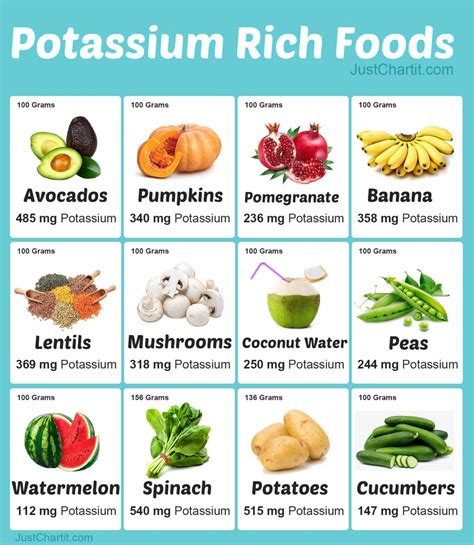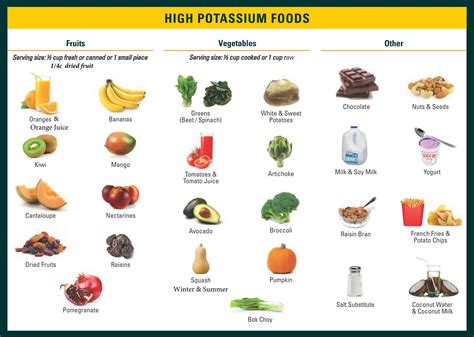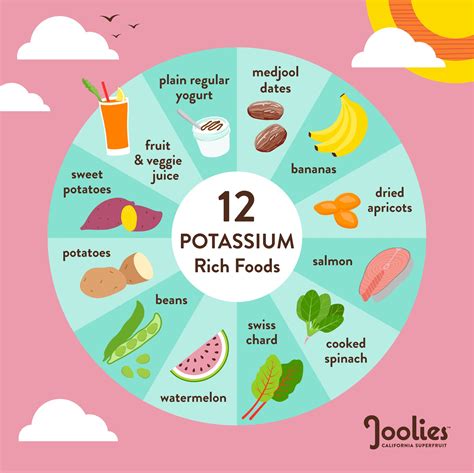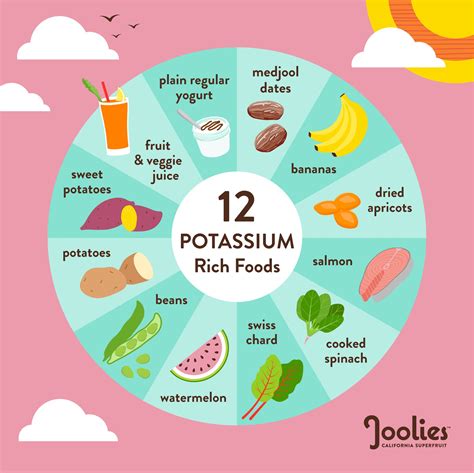Intro
Discover potassium rich foods list, including bananas, leafy greens, and nuts, to boost heart health, lower blood pressure, and support healthy muscles with essential electrolytes and minerals.
Potassium is an essential mineral that plays a crucial role in maintaining various bodily functions, including heart health, blood pressure, and bone strength. It is also important for muscle function, nerve function, and hydration. With so many benefits, it's no wonder that incorporating potassium-rich foods into your diet is a great way to boost overall health. In this article, we will delve into the world of potassium-rich foods, exploring the benefits, types, and ways to incorporate them into your daily meals.
The importance of potassium cannot be overstated. It helps regulate fluid balance, supports healthy blood pressure, and aids in the transmission of nerve impulses. Furthermore, potassium helps maintain strong bones, reduces the risk of kidney stones, and supports healthy muscle function. With the numerous benefits of potassium, it's essential to ensure you're getting enough of this vital mineral in your diet. The recommended daily intake of potassium varies by age and sex, but most adults need around 4,700 milligrams per day.
A well-balanced diet that includes a variety of whole foods can provide adequate amounts of potassium. Foods rich in potassium include fruits, vegetables, whole grains, lean proteins, and low-fat dairy products. Some of the richest sources of potassium include leafy greens, such as spinach and kale, as well as fruits like bananas, avocados, and apricots. Nuts and seeds, like almonds and pumpkin seeds, are also excellent sources of potassium. By incorporating these foods into your diet, you can reap the numerous benefits of potassium and maintain optimal health.
Potassium Rich Foods

Potassium-rich foods can be categorized into several groups, including fruits, vegetables, whole grains, lean proteins, and low-fat dairy products. Some of the top potassium-rich foods include:
- Bananas: 1 medium banana contains around 422 milligrams of potassium
- Spinach: 1 cup cooked spinach contains around 840 milligrams of potassium
- Avocados: 1 medium avocado contains around 708 milligrams of potassium
- Sweet potatoes: 1 medium sweet potato contains around 542 milligrams of potassium
- Salmon: 3 ounces cooked salmon contains around 534 milligrams of potassium
- Almonds: 1 ounce almonds contains around 718 milligrams of potassium
- Greek yogurt: 1 cup Greek yogurt contains around 579 milligrams of potassium
Benefits of Potassium Rich Foods
The benefits of potassium-rich foods are numerous and well-documented. Some of the key benefits include: * Lower blood pressure: Potassium helps balance sodium levels, reducing blood pressure and the risk of heart disease * Healthy bones: Potassium helps maintain strong bones, reducing the risk of osteoporosis and fractures * Reduced risk of kidney stones: Potassium helps reduce the formation of kidney stones by increasing urine production and reducing mineral concentration * Improved muscle function: Potassium helps regulate muscle contractions, reducing the risk of muscle cramps and weakness * Healthy nerve function: Potassium helps transmit nerve impulses, reducing the risk of nerve damage and disordersPotassium Deficiency

A potassium deficiency, also known as hypokalemia, can occur when the body loses too much potassium or fails to consume enough potassium-rich foods. Symptoms of a potassium deficiency include:
- Muscle weakness and cramps
- Fatigue and lethargy
- Heart palpitations and arrhythmias
- Constipation and abdominal cramps
- Numbness and tingling in the extremities
To avoid a potassium deficiency, it's essential to consume a balanced diet that includes a variety of potassium-rich foods. Additionally, individuals who engage in strenuous exercise, experience excessive sweating, or take certain medications may need to increase their potassium intake to compensate for losses.
Potassium Rich Foods for Heart Health
Potassium-rich foods play a crucial role in maintaining heart health. Some of the top potassium-rich foods for heart health include: * Leafy greens: Spinach, kale, and collard greens are rich in potassium and fiber, making them an excellent choice for heart health * Fatty fish: Fatty fish like salmon, tuna, and mackerel are rich in potassium and omega-3 fatty acids, reducing inflammation and improving heart function * Avocados: Avocados are rich in potassium, healthy fats, and fiber, making them an excellent choice for heart health * Sweet potatoes: Sweet potatoes are rich in potassium, fiber, and antioxidants, reducing inflammation and improving heart function * Almonds: Almonds are rich in potassium, healthy fats, and fiber, making them an excellent snack for heart healthPotassium Rich Foods for Athletes

Athletes and individuals who engage in strenuous exercise require more potassium to compensate for losses through sweat. Some of the top potassium-rich foods for athletes include:
- Bananas: Bananas are a convenient and easily digestible source of potassium, making them an excellent choice for athletes
- Coconut water: Coconut water is a natural source of potassium, electrolytes, and hydration, making it an excellent choice for athletes
- Avocados: Avocados are rich in potassium, healthy fats, and fiber, making them an excellent choice for athletes
- Nuts and seeds: Nuts and seeds like almonds, cashews, and pumpkin seeds are rich in potassium, healthy fats, and fiber, making them an excellent snack for athletes
- Dried fruits: Dried fruits like dates, apricots, and prunes are rich in potassium, fiber, and antioxidants, making them an excellent choice for athletes
Potassium Rich Foods for Bone Health
Potassium-rich foods play a crucial role in maintaining bone health. Some of the top potassium-rich foods for bone health include: * Leafy greens: Leafy greens like spinach, kale, and collard greens are rich in potassium, calcium, and vitamin K, making them an excellent choice for bone health * Fatty fish: Fatty fish like salmon, tuna, and mackerel are rich in potassium, omega-3 fatty acids, and vitamin D, reducing inflammation and improving bone health * Fortified dairy products: Fortified dairy products like milk, cheese, and yogurt are rich in potassium, calcium, and vitamin D, making them an excellent choice for bone health * Sweet potatoes: Sweet potatoes are rich in potassium, fiber, and antioxidants, reducing inflammation and improving bone health * Almonds: Almonds are rich in potassium, healthy fats, and fiber, making them an excellent snack for bone healthPotassium Rich Foods for Kidney Health

Potassium-rich foods play a crucial role in maintaining kidney health. Some of the top potassium-rich foods for kidney health include:
- Leafy greens: Leafy greens like spinach, kale, and collard greens are rich in potassium, fiber, and antioxidants, reducing inflammation and improving kidney function
- Berries: Berries like blueberries, strawberries, and raspberries are rich in potassium, fiber, and antioxidants, reducing inflammation and improving kidney function
- Fatty fish: Fatty fish like salmon, tuna, and mackerel are rich in potassium, omega-3 fatty acids, and vitamin D, reducing inflammation and improving kidney function
- Sweet potatoes: Sweet potatoes are rich in potassium, fiber, and antioxidants, reducing inflammation and improving kidney function
- Almonds: Almonds are rich in potassium, healthy fats, and fiber, making them an excellent snack for kidney health
Potassium Rich Foods for Muscle Function
Potassium-rich foods play a crucial role in maintaining muscle function. Some of the top potassium-rich foods for muscle function include: * Bananas: Bananas are a convenient and easily digestible source of potassium, making them an excellent choice for muscle function * Avocados: Avocados are rich in potassium, healthy fats, and fiber, making them an excellent choice for muscle function * Nuts and seeds: Nuts and seeds like almonds, cashews, and pumpkin seeds are rich in potassium, healthy fats, and fiber, making them an excellent snack for muscle function * Leafy greens: Leafy greens like spinach, kale, and collard greens are rich in potassium, fiber, and antioxidants, reducing inflammation and improving muscle function * Fatty fish: Fatty fish like salmon, tuna, and mackerel are rich in potassium, omega-3 fatty acids, and vitamin D, reducing inflammation and improving muscle functionPotassium Rich Foods for Nerve Function

Potassium-rich foods play a crucial role in maintaining nerve function. Some of the top potassium-rich foods for nerve function include:
- Leafy greens: Leafy greens like spinach, kale, and collard greens are rich in potassium, fiber, and antioxidants, reducing inflammation and improving nerve function
- Fatty fish: Fatty fish like salmon, tuna, and mackerel are rich in potassium, omega-3 fatty acids, and vitamin D, reducing inflammation and improving nerve function
- Nuts and seeds: Nuts and seeds like almonds, cashews, and pumpkin seeds are rich in potassium, healthy fats, and fiber, making them an excellent snack for nerve function
- Sweet potatoes: Sweet potatoes are rich in potassium, fiber, and antioxidants, reducing inflammation and improving nerve function
- Avocados: Avocados are rich in potassium, healthy fats, and fiber, making them an excellent choice for nerve function
Potassium Rich Foods for Hydration
Potassium-rich foods play a crucial role in maintaining hydration. Some of the top potassium-rich foods for hydration include: * Coconut water: Coconut water is a natural source of potassium, electrolytes, and hydration, making it an excellent choice for hydration * Watermelon: Watermelon is rich in potassium, water content, and electrolytes, making it an excellent choice for hydration * Celery: Celery is rich in potassium, water content, and electrolytes, making it an excellent snack for hydration * Cucumbers: Cucumbers are rich in potassium, water content, and electrolytes, making them an excellent choice for hydration * Strawberries: Strawberries are rich in potassium, water content, and electrolytes, making them an excellent snack for hydrationConclusion and Final Thoughts
In conclusion, potassium-rich foods play a vital role in maintaining overall health and well-being. By incorporating a variety of potassium-rich foods into your diet, you can reap the numerous benefits of potassium, including lower blood pressure, healthy bones, and improved muscle function. Whether you're an athlete, individual with kidney disease, or simply looking to improve your overall health, potassium-rich foods are an excellent choice. So, go ahead and indulge in these delicious and nutritious foods, and experience the incredible benefits of potassium for yourself!What are the symptoms of a potassium deficiency?
+Symptoms of a potassium deficiency include muscle weakness and cramps, fatigue and lethargy, heart palpitations and arrhythmias, constipation and abdominal cramps, and numbness and tingling in the extremities.
What are the best potassium-rich foods for heart health?
+The best potassium-rich foods for heart health include leafy greens, fatty fish, avocados, sweet potatoes, and almonds. These foods are rich in potassium, fiber, and antioxidants, reducing inflammation and improving heart function.
Can I get enough potassium from supplements?
+While supplements can provide potassium, it's always best to get essential nutrients from whole foods. Potassium-rich foods provide a range of other essential nutrients, including fiber, vitamins, and minerals, that are important for overall health and well-being.
How much potassium do I need per day?
+The recommended daily intake of potassium varies by age and sex, but most adults need around 4,700 milligrams per day. However, individual needs may vary depending on factors such as age, sex, and overall health.
Can I consume too much potassium?
+Yes, it is possible to consume too much potassium. Excessive potassium consumption can lead to symptoms such as muscle weakness, fatigue, and heart palpitations. It's essential to consume potassium-rich foods in moderation and consult with a healthcare professional if you have concerns about your potassium intake.
We hope this article has provided you with a comprehensive understanding of potassium-rich foods and their importance for overall health and well-being. Whether you're looking to improve your heart health, bone health, or simply want to maintain optimal health, incorporating potassium-rich foods into your diet is an excellent choice. So, go ahead and share this article with your friends and family, and start experiencing the incredible benefits of potassium-rich foods today!
